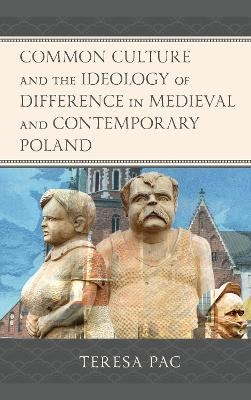
Common Culture and the Ideology of Difference in Medieval and Contemporary Poland
Seiten
2022
Lexington Books (Verlag)
978-1-7936-2691-2 (ISBN)
Lexington Books (Verlag)
978-1-7936-2691-2 (ISBN)
This study examines shared culture in medieval and contemporary Poland. The author argues that shared culture produced by ethnically, religiously, and linguistically diverse societies—rather than elitist values or institutional, ethnic, and religious differences—was foundational to societal survival in medieval Polish cities.
The author enters a much-needed discussion on shared culture as foundational to societal survival. Through the examination of common culture as a process in medieval Kraków, Poznań, and Lublin, the author challenges the ideology of difference, including institutional, religious, ethnic, and nationalistic. In their denial of ethnic and religious diversity, the author contends, medieval rulers employed the Catholic Church's moral authority, which had been tested in Western European societies. Similar, the author maintains, twenty-first century Polish leaders utilize anachronistic approaches in the invention of Polish Catholic identity to counteract the country's increasing ethnic and religious diversity. As in the medieval period, the contemporary Polish political and social elites subscribe to the European Union's ideology of difference, legitimized by a European Christian heritage, and its intended basis for discrimination against non-Christians and non-white individuals under the auspices of democratic values and minority rights, among which Muslims are a significant target.
The author enters a much-needed discussion on shared culture as foundational to societal survival. Through the examination of common culture as a process in medieval Kraków, Poznań, and Lublin, the author challenges the ideology of difference, including institutional, religious, ethnic, and nationalistic. In their denial of ethnic and religious diversity, the author contends, medieval rulers employed the Catholic Church's moral authority, which had been tested in Western European societies. Similar, the author maintains, twenty-first century Polish leaders utilize anachronistic approaches in the invention of Polish Catholic identity to counteract the country's increasing ethnic and religious diversity. As in the medieval period, the contemporary Polish political and social elites subscribe to the European Union's ideology of difference, legitimized by a European Christian heritage, and its intended basis for discrimination against non-Christians and non-white individuals under the auspices of democratic values and minority rights, among which Muslims are a significant target.
Teresa Pac is associate professor at the University of Central Oklahoma.
Lists of Figures
Preface
Introduction. Common Culture and the Ideology of Difference in Medieval and Contemporary Poland
Chapter 1. A Common Culture in Late Fourteenth-Century Kraków, Poznań, and Lublin
Chapter 2. The Common Culture of Kraków, Poznań, and Lublin between the 1380s and 1450s
Chapter 3. The Pretext of Catholic Royal Power through Spectacles, Visual Language, and Written Texts
Chapter 4. Poland and the EU: Common Culture and the Segregational Politics of Equality
Conclusion
Bibliography
Index
About the Author
| Erscheinungsdatum | 17.01.2022 |
|---|---|
| Verlagsort | Lanham, MD |
| Sprache | englisch |
| Maße | 160 x 227 mm |
| Gewicht | 730 g |
| Themenwelt | Geisteswissenschaften ► Geschichte ► Regional- / Ländergeschichte |
| ISBN-10 | 1-7936-2691-X / 179362691X |
| ISBN-13 | 978-1-7936-2691-2 / 9781793626912 |
| Zustand | Neuware |
| Haben Sie eine Frage zum Produkt? |
Mehr entdecken
aus dem Bereich
aus dem Bereich
Universalgelehrter, Polarreisender, Entdecker
Buch | Hardcover (2024)
mareverlag
28,00 €


